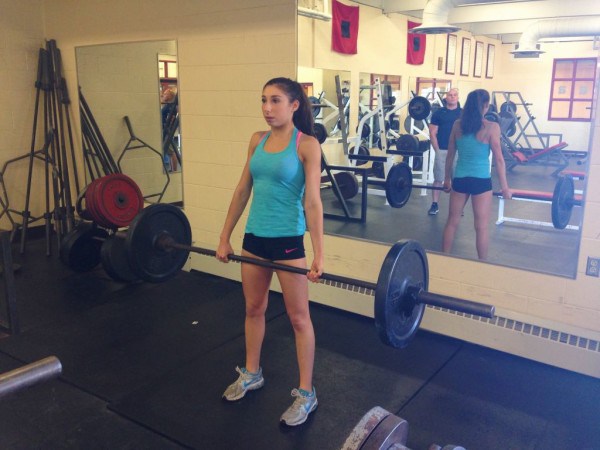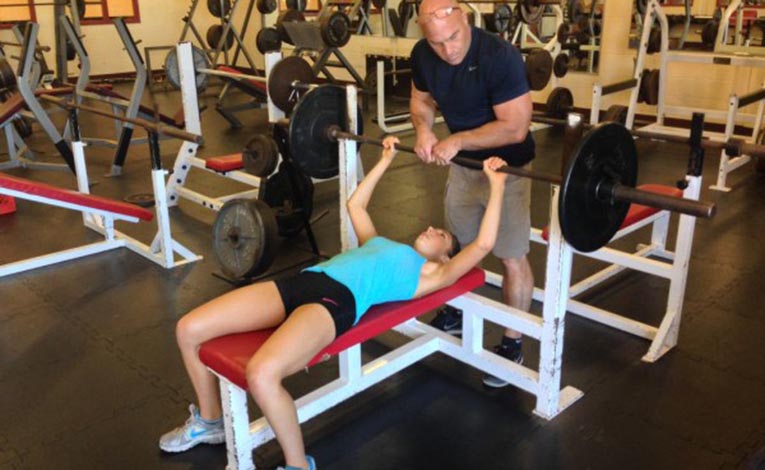Recovering from anorexia is a feat of its own.
Overcoming anorexia to become a powerlifter, all by the age of 16, brings new meaning to the word recovery.
Antonia Caruso, a junior at Scarborough High School, started weightlifting in February to get stronger for cheerleading. Prior to that, she took a break from cheerleading – and from school.
“My eating habits were very skewed in middle school,” Caruso said Tuesday afternoon in the weight room at Scarborough High School. “I was obsessed with dieting.”
Her condition culminated when, two days before Halloween in 2013, she was admitted to the New England Eating Disorder program at Mercy Hospital for anorexia rehabilitation. Caruso spent nearly the next two months in treatment, until she was released in mid-December.
“I didn’t believe I was sick,” Caruso recalled. “I didn’t want to believe I was sick.”
She completed the rest of her freshman year, but she relapsed again the next summer, which Caruso attributes to her failure to actually face the fact that she was suffering from anorexia.
“If you don’t want to recover,” she said, “you’re not going to.”
Caruso went into treatment again from May to July 2014. That time, something clicked. She willed herself to get better, she said, and she did.
When Caruso started high school she resumed training for cheerleading, and started weightlifting after school alongside the football players.
That’s when she met Jeff Quirk, a volunteer coach for the football team, who was a powerlifter in the 1980s.
Quirk saw Caruso doing squats, and decided to give her a few tips on her technique. Almost immediately, Quirk said, he could tell that Caruso had serious untapped strength and potential.
“I instantly knew she was so coachable, and then she kept coming back, kept coming back, kept coming back,” Quirk said.
Soon, Caruso, too, became aware of her strength, and she and Quirk began working together. “He started giving me all these techniques on how to get stronger,” she said.
When the possibility of powerlifting came up, Caruso wasn’t even aware of what the lifts were. But Quirk and other coaches, including Michelle Brown, taught Caruso how to squat, dead lift and bench press.
Nearly nine months later, Caruso, at about 116 pounds, can squat and deadlift double her body weight. She can also practically bench press her body weight, give or take about 10 pounds, which she calls her “weakest” area.
Her performance and ability, Quirk said, is “off the chart. It’s ridiculous.”
On Saturday, Sept. 26, Caruso competed as a novice in the Organization of Competitive Bodybuilding competition in Biddeford, and placed fifth in the open class category and the women’s figure contest.

“She was the youngest competitor on the stage, competing against women who have been training for years,” Quirk said. Placing in a competition after training in the gym for only nine months is “unheard of,” he said, and she did all of it without dieting.
For someone “to go from where she started to get on that stage would normally take years,” Quirk said. Moreover, he said, “it’s unusual for a bodybuilder to be such a strong powerlifter.”
Caruso has strengthened her body, but what’s more important is that she has strengthened her mind.
“It has helped me so much with my eating disorder. I’m not scared of eating anymore,” she said.
Now, her goal is to gain weight. “It’s weird, thinking back, my goal was to always drop weight, and now I want to gain it,” she said. “It feels strange to say that.”
Her mom, Christine Haley, said there is a “remarkable difference” in her daughter.
“As I saw her get stronger, and as a mom, there’s always a (fear) that the hidden person who tells her, ‘Don’t eat that,’ will come out,” she said.
Caruso said many people tell her it’s dangerous to work out so much with an eating disorder in her past. “But I know myself, and this makes me happy,” she said. “How can something I love so much be related to something so terrible?”
Caruso hopes to compete again, but probably not for another year. For now, she’s sticking to her five-day training routine and not cutting calories, but eating a healthy diet, which might include the occasional large pizza, which she can “take down easily.”
Mostly, what she wants is for someone else struggling with anorexia to hear her story and for it to be “their sign” to recover, she said.
“I want someone to see this and know that this is permission for them to get better,” Caruso said.
Courtesy of: Bangor Daily News
